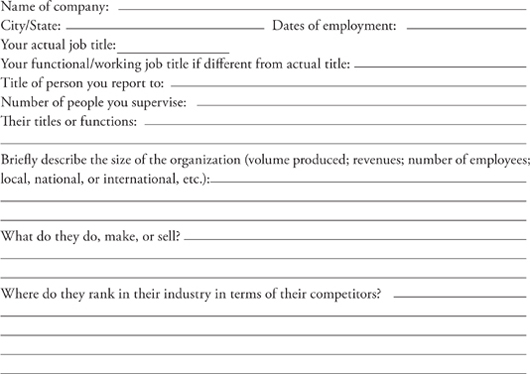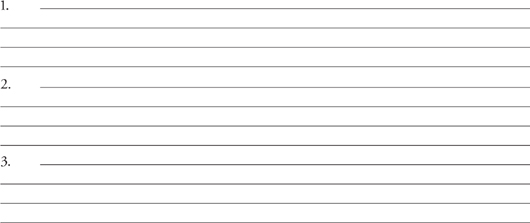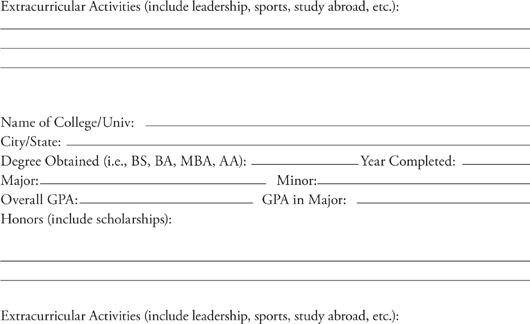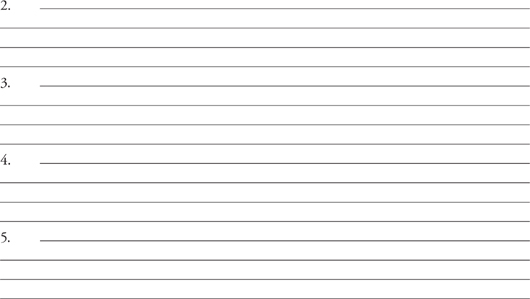CHAPTER 3
YOUR RESUME IS A GARBAGE IN/GARBAGE OUT PROPOSITION
HOW WELL THE most financially important document you are ever going to own comes out depends on what goes in. So if you don’t want a garbage resume, you need a logical way to gather the right information to tell that story.
When you got inside your customer’s head in the previous chapter, you gained a clear understanding of the story your resume needs to tell. Now, with the requirements and deliverables of your Target Job Deconstruction (TJD) document in front of you for focus, it’s time to work through your professional life, methodically pulling out the skills and experiences that will help your resume tell the most effective story of someone who can nail this target job.
The Right Way to Look Into Your Work History
Your resume is a document that tells a story about your collective professional work experiences. For the most powerful resume, you should examine your work history through the lens of your TJD, because it succinctly defines exactly what your customer—the employer—wants to find. This gives you guidelines for the most effective ways to define the professional you. The information you gather will be customized to your customers’ needs, giving you the raw materials for a killer resume. The more information you gather, the better. Even if some of it doesn’t make it into your resume, it will still have immense value preparing you for the interviews, because this information-gathering exercise will continue to increase the insights you gain into the real professional you as a commodity and a brand. (More on this later.)
Fifty Percent of the Success of Any Project Is in the Preparation
Here’s the link http://my.knockemdead.com/downloads for the information-gathering questionnaire I use for my professional resume-writing service clients. It will help you gather all the resume-relevant information about your professional life in one place. To help you get the most out of this not-very-exciting task, you’ll find a lot of “how to and why to” advice as you work through it.
It’s obviously best to do this kind of work on your computer: you never run out of space and all the information will be collected and saved in a Microsoft Word document, ready to be molded into a finished resume. Go to www.knockemdead.com and click on the “Downloads” page to find and download your Microsoft Word copy of the following “Resume Questionnaire.” Remember: Half the success of any project depends on the preparation. The work you do here is also going to have a real impact on your career and the quality of your life outside of work for years to come. So bite the bullet and do it right.
Resume Questionnaire
Please Note: An electronic document is expandable, so if you need additional space, don’t limit yourself to the lines/pages provided.
Your first step is to complete the critical Target Job Deconstruction exercise. This will create a composite job description and bring focus to the story your resume needs to tell.

Please answer the following questions as completely and accurately as possible. Not all questions may apply to you. If they do not apply, mark them N/A.
Position/Career Objective: List top three job title choices in order of preference.
If the titles are for related positions (e.g. 1–Sales; 2–Marketing; 3–Business Development) your resume will be developed to reflect the cross-functional target(s). If the goals are not related (e.g. 1–Rocket Scientist; 2–Pastry Chef; 3–Landscape Designer), the resume will be written to fit your first selection. (We will discuss creating additional versions of your resume later.)

Desired Industry Segment ________________________________________
Is this a career change for you? Yes ( ) No ( )
Purpose of Resume (e.g. job change, career change, promotion, business development/marketing tool)_____________________________________________________
Summarize your experience in this field in a couple of sentences. Do not provide details of positions here: we only want to get the big picture; just a sentence or two about your background. For example: I have been in the accounting field for twelve years and received three promotions to my current position, which I’ve held for two years.
What are some terms (keywords) specific to your line of work? (You found these during the TJD process.)

What are the key strengths that you want to highlight on your resume? What makes you stand out from your competitors? Drill down to the essence of what differentiates your candidacy.

Current Salary: _________________Expected Salary: _________
Education
List all degrees, certificates, diplomas received, dates received, school or college, and location of school or college. Begin with the most recent and work backward.


High School (only if no college)
Name:_________________City/State:___________Year:___________
Professional Development (training courses/seminars/workshops, etc.)
Ongoing professional education signals commitment to success. If you attended numerous courses, list the most recent and/or relevant to your career and indicate that additional course information is available. Ignore those courses that have been rendered obsolete by technology and the passage of time.

Professional Certifications

Professional Licenses

Military (include branch of service, locations, position, rank achieved, years of service, honorable discharge, key accomplishments, special recognition, awards, etc.)

Professional Organizations/Affiliations
Active membership in a professional association is a key tool for career resiliency and success.

Publications/Presentations

Patents and Copyrights
You can also include here your work on projects that resulted in copyrights and patents, so long as you make clear your real contribution.

Computer Skills (include hardware, operating systems, software, Internet, e-mail, etc.)
Maybe it’s just Microsoft Word and Excel or maybe it runs to languages and protocols. Nobody today gets ahead without technological adeptness. Capture your fluency here and update regularly; that alphabet soup of technology just might help your resume in database searches.
Hardware:

Operating Systems:

Software Applications:

Other if relevant:

Foreign Languages (indicate level of fluency and if verbal/written)

Global Experience/Cultural Diversity Awareness
In our global economy any exposure here is relevant, and it doesn’t have to be professional in nature. If you’ve traveled extensively or you were an Army brat and grew up in ten different countries, that can be a big plus. Just name the countries, not the circumstances.
Corporate Awards/Recognition (indicate where and when received):

Community/Volunteer Activities (name of organization, years involved, positions held):

Hobbies/Interests/Avocations
Include activities with which you fill your out-of-work hours. Your resume may include those activities that say something positive about the professional you. For example, in sales and marketing just about all group activities show a desirable mindset. Bridge might argue strong analytical skills, and the senior exec who still plays competitive lacrosse and runs marathons is crazy not to let the world know.

Action Verbs
In describing your work experience at each position you have held, it might be helpful to select from the following list the action verbs that best characterize your daily work, duties, responsibilities, and level of authority. Select from the following list or use other “action verbs” when completing the sections stating: Briefly describe your routine duties, responsibilities, and level of authority.
Do not provide the information here; instead, use it as a guide in completing the information for each position you’ve held.
These are just suggestions. Please don’t limit yourself to the use of these verbs only.
accepted
accomplished
achieved
acted
adapted
addressed
administered
advanced
advised
allocated
analyzed
appraised
approved
arranged
assembled
assigned
assisted
attained
audited
authored
automated
balanced
budgeted
built
calculated
cataloged
chaired
clarified
classified
coached
collected
compiled
completed
composed
computed
conceptualized
conducted
consolidated
contained
contracted
contributed
controlled
coordinated
corresponded
counseled
created
critiqued
cut
decreased
defined
delegated
demonstrated
designed
developed
devised
diagnosed
directed
dispatched
distinguished
diversified
drafted
edited
educated
eliminated
emended
enabled
encouraged
engineered
enlisted
established
evaluated
examined
executed
expanded
expedited
explained
extracted
fabricated
facilitated
familiarized
fashioned
focused
forecast
formulated
founded
generated
guided
headed up
identified
illustrated
implemented
improved
increased
indoctrinated
influenced
informed
initiated
innovated
inspected
installed
instigated
instituted
instructed
integrated
interpreted
interviewed
introduced
invented
launched
lectured
led
maintained
managed
marketed
mediated
moderated
monitored
motivated
negotiated
operated
organized
originated
overhauled
oversaw
performed
persuaded
planned
prepared
presented
prioritized
processed
produced
programmed
projected
promoted
proposed
provided
publicized
published
purchased
reconciled
recorded
recruited
reduced
referred
regulated
rehabilitated
remodeled
repaired
represented
researched
resolved
restored
restructured
retrieved
revamped
revitalized
saved
scheduled
schooled
screened
set
shaped
solidified
solved
specified
stimulated
streamlined
strengthened
summarized
supervised
surveyed
systemized
tabulated
taught
trained
translated
traveled
trimmed
upgraded
validated
worked
wrote
Accomplishments/Achievements/Successes
When completing the next few pages of the questionnaire, refer to the following questions to refresh your memory regarding accomplishments and achievements (professional experience) for each position. Remember: people hire results (accomplishments and achievements) and look to past performance as an indication of the value you offer.
You don’t need to provide answers to all these questions here. Rather, consider the various positions you’ve held and come up with 4–6 of the strongest contributions you made in each position. As you think about this, read through the questions to help stimulate your thinking. Above all, ask yourself how your current employer is better off now than when the company hired you.
1. Did you increase sales/productivity/volume? Provide percentage or amount.
2. Did you generate new business or increase client base? How? What were the circumstances?
3. Did you forge affiliations, partnerships, or strategic alliances that increased company success? With whom, and what were the results?
4. Did you save your company money? If so, how and by how much?
5. Did you design and/or institute any new systems and procedures? If so, what were the results?
6. Did you meet an impossible deadline through extra effort? If so, what difference did this make to your company?
7. Did you bring a major project in under budget? If so, how did you make this happen? What was the budget? What were you responsible for saving in terms of time and/or money?
8. Did you suggest and/or help launch a new product or program? If so, did you take the lead or provide support? How successful was the effort? What were the results?
9. Did you assume new responsibilities that weren’t part of your job? Were they assigned or did you do so proactively? Why were you selected?
10. Did you improve communication in your firm? If so, with whom, and what was the outcome?
11. How did your company benefit from your performance?
12. Did you complete any special projects? What were they and what was the result?
When describing your accomplishments/achievements, use the following three-step CAR format:
C = Challenge (What challenge did you face or what problem did you resolve?)
A = Action (What action did you take?)
R = Results (What was the result of the action you took? What was the value to the company?)
Professional Experience
All right, now you’re ready to assemble information about your work history and experience. Begin with your present employer/project. Include self-employment, contract, and volunteer or unpaid work if it applies to your career target.
Be sure to list different positions at the same company as separate jobs. Repeat the section below as many times as you need to in order to encompass all the professional positions you’ve held.

Briefly describe your routine duties, responsibilities, and level of authority. Use numbers (size) and percentages, quantify budgets, state with whom you interacted, etc. Provide two to three brief sentences about your major overall area of responsibility and list them in order of importance. Refer back to the list of action verbs to help you brainstorm.
Example
Selected to re-engineer and revitalize this $65 million business unit with accountability for thirty-two direct reports in four cities across the United States. Established strategic vision and developed operational infrastructure. Managed Supply Chain, Logistics/Distribution, Forecasting, System Integration, Project Management, Contracts Administration, and Third-Party Site Operations.
Or more simply: Drove production for world’s largest wallboard plant, with 258 employees working in multiple shifts.

Briefly describe 3–5 of your accomplishments in this position. Use the most significant achievements or contributions that best support your career target and describe them in a brief statement, referring to the accomplishments guidelines. Use numbers wherever possible. Give facts and figures. Please note: Distill the accomplishments into their essence. How did your accomplishment contribute to bottom line performance/ROI?

Take Your Time: You’re Laying the Foundation for Career Success
Be sure to take the time to do this exercise right. It may be tempting to rush through it or look for shortcuts, but remember that you’re assembling the information that’s going to be the brick and mortar of your resume, the most financially important document you are ever going to own. You need it to be as complete and well thought out as possible.




